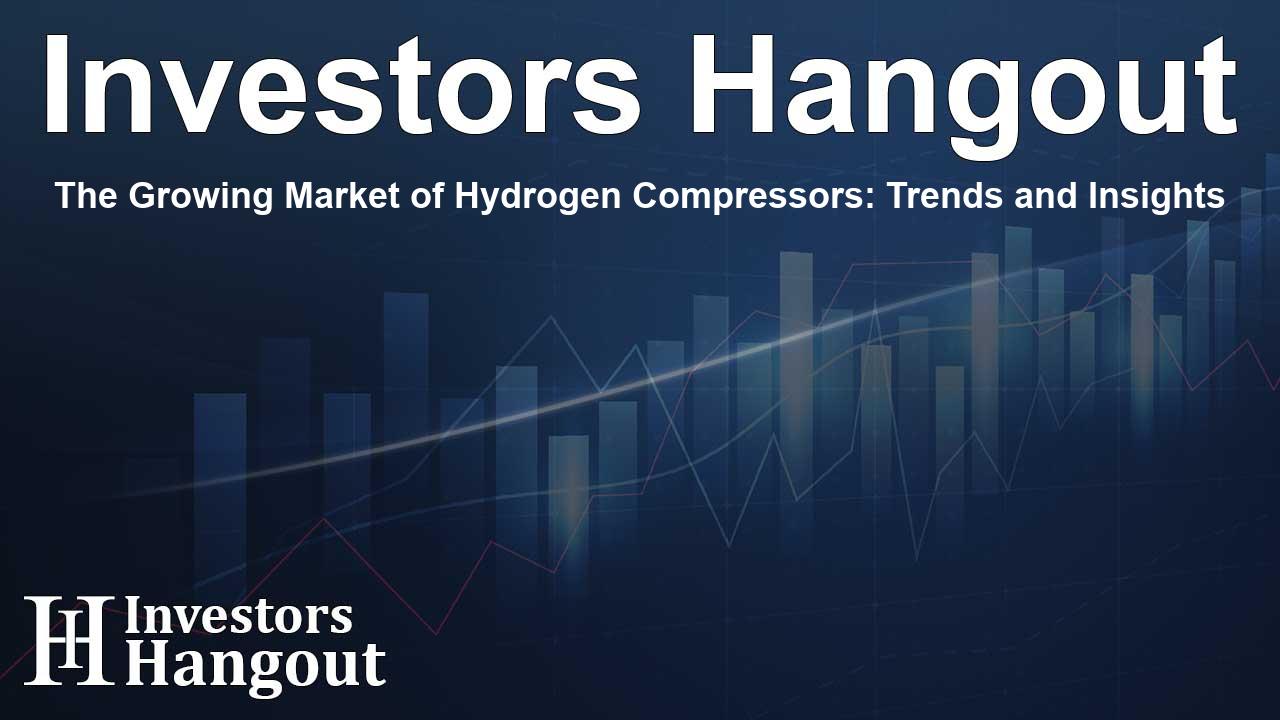The Growing Market of Hydrogen Compressors: Trends and Insights

The Expanding Hydrogen Compressor Market
The hydrogen compressor market is witnessing significant growth as global demand for sustainable energy solutions rises. Recent studies indicate that the market was valued at approximately USD 2.28 billion in a given year and is projected to reach around USD 4.45 billion by a specified future date, boasting a compound annual growth rate (CAGR) of approximately 6.9% between the years of growth.
Market Overview
Industry Dynamics and Growth Drivers
The hydrogen compressor market is advancing rapidly due to a pressing need for efficient energy storage, supply chain management, and diverse industrial applications. Major regions leading this surge include North America, focusing on innovative digital infrastructures, while Europe emphasizes compliance-driven AI monitoring and predictive maintenance. The expanding urbanization and renewable energy initiatives across Asia-Pacific also propel market adoption.
Key Market Trends
One prominent trend is the increasing investment in green hydrogen initiatives. This trend is driven by ambitious decarbonization targets set by governments and private enterprises nationwide. Hydrogen compressors are pivotal for the storage, transportation, and utilization of hydrogen, significantly contributing to the energy, mobility, and industrial sectors. Major projects worldwide are scaling electrolyzer capacities, which in turn elevates the demand for compressors.
The Role of Hydrogen in Energy Mobility
Accelerating the Hydrogen Mobility Sector
Hydrogen fuel cell vehicles, including cars, buses, trucks, and trains, are gaining traction as nations push towards cleaner mobility solutions. Hydrogen stations utilize compressors to pressurize hydrogen for effective storage and fueling. This growing hydrogen fueling infrastructure in markets like Japan, South Korea, and Germany further ensures long-term growth opportunities for compressors.
SWOT Analysis of Hydrogen Compressors
Strengths: Hydrogen compressors are recognized for their energy efficiency and reliability. Advanced technologies like AI surveillance and IoT integrations streamline operations, bolstering market demand.
Weaknesses: The high initial investment and maintenance costs pose challenges, limiting accessibility for many potential users.
Opportunities: The burgeoning hydrogen and green energy projects present abundant opportunities to integrate advanced technologies into compressor solutions, enhancing performance and sustainability.
Threats: Market growth might be hindered by fluctuations in raw material costs, stringent regulatory environments, and competition in the sector.
Regional Market Insights
North America: A Leader in Hydrogen Technologies
North America is currently valued as one of the most developed hydrogen compressor markets. Targeted investments in hydrogen infrastructure and government incentives fuel significant growth in this region. Projections indicate that the market could expand notably in the coming years.
Europe: Driving Towards Sustainability
In Europe, various nations are rapidly establishing green hydrogen facilities backed by government policies focused on sustainability. Key players in the market are advancing compressor technologies to meet evolving energy demands and regulatory requirements.
Asia-Pacific: Rapid Growth and Development
The Asia-Pacific region is at the forefront of the hydrogen compressor market due to industrial growth and government-led initiatives promoting hydrogen adoption in multiple sectors. Countries including China and India are making significant strides in developing hydrogen fueling stations and green hydrogen projects.
Conclusion
As the hydrogen compressor market continues its upward trajectory, driven by technological advancements and a worldwide shift towards renewable energy, stakeholders across various sectors are poised to capitalize on these trends. The future looks promising as investments and innovations pave the way for sustainable energy solutions globally.
Frequently Asked Questions
What is the current size of the hydrogen compressor market?
The hydrogen compressor market is currently valued at around USD 2.28 billion and is expected to grow significantly in the coming years.
What factors drive growth in the hydrogen compressor market?
The growth is propelled by increasing investments in green hydrogen, technological advancements, and a global shift towards sustainable energy.
Which regions are leading in hydrogen compressor innovations?
North America, Europe, and the Asia-Pacific are leading regions, each focusing on unique aspects of hydrogen infrastructure and technologies.
What are the challenges faced by the hydrogen compressor industry?
Challenges include high initial costs, integration complexities, and fluctuating raw material prices.
How is the hydrogen mobility sector influencing compressor demand?
The hydrogen mobility sector, promoting fuel cell vehicles, directly impacts the demand for hydrogen compressors as fueling stations become essential.
About The Author
Contact Dominic Sanders privately here. Or send an email with ATTN: Dominic Sanders as the subject to contact@investorshangout.com.
About Investors Hangout
Investors Hangout is a leading online stock forum for financial discussion and learning, offering a wide range of free tools and resources. It draws in traders of all levels, who exchange market knowledge, investigate trading tactics, and keep an eye on industry developments in real time. Featuring financial articles, stock message boards, quotes, charts, company profiles, and live news updates. Through cooperative learning and a wealth of informational resources, it helps users from novices creating their first portfolios to experts honing their techniques. Join Investors Hangout today: https://investorshangout.com/
The content of this article is based on factual, publicly available information and does not represent legal, financial, or investment advice. Investors Hangout does not offer financial advice, and the author is not a licensed financial advisor. Consult a qualified advisor before making any financial or investment decisions based on this article. This article should not be considered advice to purchase, sell, or hold any securities or other investments. If any of the material provided here is inaccurate, please contact us for corrections.
